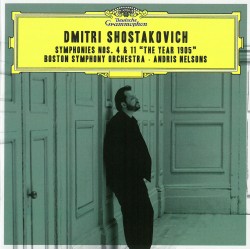 Shostakovich – Symphonies Nos. 4 & 11 “The Year 1905”
Shostakovich – Symphonies Nos. 4 & 11 “The Year 1905”
Boston Symphony Orchestra; Andris Nelsons
Deutsche Grammophon 80028595-02 (deutschegrammophon.com)
It says here there was no greater symphonist of the 20th century than Shostakovich. Don’t @ me, as they say on Twitter. This DG recording of the Boston Symphony, led by Andris Nelsons, is part of their ongoing project to record the complete cycle by the beleaguered Russian artist.
The story behind his Symphony No.4 is relevant to any reading of the piece, although much too involved to fully recount here. Suffice it to say he fell into sudden disfavour with Stalin while working on it, and finally chose to withdraw the work before its premiere. The move, while an illustration of how little freedom an artist had during the era, likely saved the composer from exile to the Gulag. (An excellent fuller version of the story is available here: michaellewanski.com/blog/2014/10/8/shostakovich-symphony-no-4-in-c-minor-op-43).
Too many adjectives can attach to the puzzling work: at turns horrifying, melodramatic, sarcastic, madcap, maudlin, macabre, morose. Shostakovich might have been passing a note to his compatriot colleagues like Alfred Schnittke and Edison Denisov: “Here is as far as you can go, and not in any safety.”
Nelsons wrings a full accounting of the hair-raising piece, all 65 minutes of it, from the redoubtable BSO musicians. I defy anyone to listen to James Somerville’s horn playing here without feeling simultaneously uplifted and devastated.
The second half of the two-disc release makes a curious pairing. Symphony No.11 was composed more than two decades later in 1957, followed an overt “program” in depicting the events of the brutally quashed 1905 Russian workers’ uprising, and was written to satisfy a government-mandated (“suggested”) recognition of the 40th anniversary of the 1917 revolution. Perhaps the idea is to contrast the work of a brash young idealist, an artist who believed he was free, to the more mature output of one who knew he never would be. Clearly in his music he felt the humanity of those starving workers, murdered a half-century earlier by a despot. There are subtexts to all of his music, and the question remains about whether this symphony reflected the composer’s views about more recent crimes.
Programmatically structured to the point of pedantry, it is nonetheless brilliantly played. Hearing these excellent players gives the heart ease.



